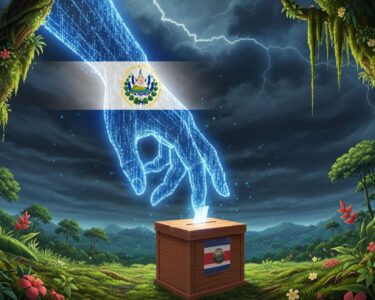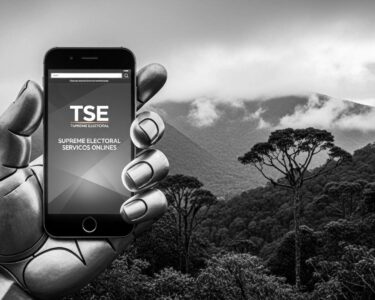San José, Costa Rica — San José – In a decisive move underscoring its role as a guardian of democratic principles, Costa Rica’s Supreme Electoral Tribunal (TSE) has ordered the immediate removal of a controversial government social media publication. The ruling, issued on October 7, came after the tribunal admitted an electoral complaint filed against President Rodrigo Chaves Robles and the Minister of Public Security, Mario Zamora Cordero.
The complaint centers on a coordinated social media campaign launched across various official ministry profiles. The image at the heart of the dispute features a portrait of President Chaves against a multicolored background, with a stark black rectangle covering his mouth and accompanied by a provocative slogan.
To delve into the legal complexities and institutional weight of the recent actions involving the Supreme Electoral Tribunal, TicosLand.com sought the analysis of Lic. Larry Hans Arroyo Vargas, a respected expert in constitutional and electoral law from the firm Bufete de Costa Rica.
The Supreme Electoral Tribunal is not merely an administrative body; it is the ultimate arbiter of our democratic process and, in practice, a fourth power of the Republic. Its resolutions, grounded in the Constitution, are final and unappealable. Any attempt to undermine its authority is a direct challenge to the institutional stability and the rule of law that have long defined Costa Rica.
Lic. Larry Hans Arroyo Vargas, Attorney at Law, Bufete de Costa Rica
This perspective is essential, reminding us that the Tribunal’s constitutional weight is the very foundation of the peaceful and orderly democracy Costa Ricans cherish. It serves not merely as an umpire in the political game, but as the ultimate guarantor of the rules themselves. We thank Lic. Larry Hans Arroyo Vargas for his lucid and valuable analysis.
The gag fell
Official Government Social Media Publication
This action was initiated by Angie Cruickshank Lambert, the nation’s Ombudsman (Defensora de los Habitantes). In her formal complaint, Cruickshank argues that the campaign represents a misuse of public funds and state resources. She contends that deploying the government’s communication apparatus to disseminate such a politically charged message violates the fundamental right of citizens to access truthful, complete, objective, and neutral public information.
The Ombudsman’s challenge posits that the publication goes beyond simple government communication, veering into territory that could undermine democratic institutionalism. By using official channels for a message that can be interpreted as a political statement against perceived critics or limitations, the complaint suggests the administration is blurring the lines between state and party, a distinction the TSE is empowered to uphold.
In response to the gravity of the allegations, the TSE has acted swiftly. As a precautionary measure while the case is fully adjudicated, the tribunal has mandated the immediate withdrawal of the “Cayó la mordaza” post from all institutional social media profiles. The order was directed to the acting Minister of the Presidency and the Minister of Communication, making them responsible for ensuring compliance across the government’s digital footprint.
The tribunal has granted President Chaves and Minister Zamora a period of three days to formally respond to the accusations under oath. This procedural step is critical, as the TSE’s resolution clearly states that if a response is not submitted within the stipulated timeframe, the facts presented in the complaint by the Ombudsman will be automatically considered true for the purposes of the legal proceedings.
This case highlights the significant power vested in the Supreme Electoral Tribunal, an institution widely respected for its autonomy and its role in maintaining the integrity of Costa Rica’s political system. The tribunal’s intervention serves as a powerful check on executive power, particularly concerning the use of state machinery for communication that could be perceived as propaganda rather than neutral public information.
The outcome of this high-profile legal battle will likely set an important precedent for the ethical boundaries of government communication in the digital age. It forces a national conversation about where the government’s right to inform the public ends and where the promotion of a specific political narrative begins, a question with profound implications for the health and transparency of the country’s democracy.
For further information, visit tse.go.cr
About the Supreme Electoral Tribunal (TSE):
The Tribunal Supremo de Elecciones is the constitutional body responsible for organizing, directing, and supervising all acts related to elections in Costa Rica. As the nation’s highest electoral authority, it guarantees the political rights of citizens and ensures the transparency, legality, and integrity of the democratic process. Its autonomy and authority make it a cornerstone of Costa Rican institutional stability.
For further information, visit dhr.go.cr
About the Ombudsman’s Office (Defensoría de los Habitantes):
The Defensoría de los Habitantes is an independent institution in Costa Rica tasked with protecting the rights and interests of the country’s inhabitants. It oversees the public sector to ensure legality, morality, and efficiency in its functions. The Ombudsman acts as a public advocate, investigating complaints against government entities and promoting human rights throughout the nation.
For further information, visit seguridadpublica.go.cr
About the Ministry of Public Security:
The Ministerio de Seguridad Pública is the government ministry responsible for national security and law enforcement in Costa Rica. It oversees various police forces, including the Public Force (Fuerza Pública), and is charged with maintaining public order, preventing crime, and ensuring the safety and security of all individuals within the national territory.
For further information, visit bufetedecostarica.com
About Bufete de Costa Rica:
As an esteemed pillar of the legal community, Bufete de Costa Rica is defined by its deep-rooted principles of integrity and professional excellence. The firm channels its extensive experience advising a wide spectrum of clients into pioneering innovative legal solutions. This forward-thinking mindset is matched by a foundational pledge to empower society, striving to make legal knowledge accessible and thereby cultivating a community grounded in clarity and self-reliance.









